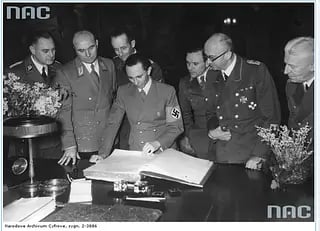Inside the Secret Diaries of Joseph Goebbels
Explore Joseph Goebbels’ hidden diaries in vivid detail—discover his ruthless propaganda strategies, emotional manipulations, and the chilling psychology behind Nazi mass control.


🖤 Prologue: The Pen of a Fanatic
In the shadowed corridors of power, where whispers mold nations and ink births ideologies, Joseph Goebbels chronicled his descent into infamy. His diaries, spanning over two decades, are not mere records—they are the pulsating heartbeat of a regime's darkest ambitions. Through his words, we traverse the twisted psyche of a man who wielded propaganda as both sword and shield, sculpting reality to fit a monstrous vision.
Goebbels' diaries are more than historical documents; they are cautionary tales of how rhetoric can be weaponized, truth distorted, and humanity forsaken. They serve as a stark reminder of the perils of unchecked power and the insidious nature of propaganda.
“The pen is mightier than the sword,” they say. In Goebbels' hands, it was both.
🖤 1923–1926: The Birth of Obsession
“Such is life: many blossoms, many thorns, and — a dark grave.”
—July 18, 1926
In the aftermath of World War I, a young Goebbels grappled with personal failures and societal upheaval. His early diary entries reveal a man torn between self-pity and grandiose dreams. Amidst romantic entanglements and existential musings, a singular obsession began to crystallize: Adolf Hitler.
“I am his to the end. My last doubts have disappeared. Germany will live! Heil Hitler!”
—July 25, 1926
This fervent devotion marked the genesis of a partnership that would redefine evil.
Goebbels' early writings are steeped in existential angst and a yearning for purpose. He was a man searching for meaning in a fractured world, and he found it in the radical ideologies of the time. His diaries from this period reveal a transformation from a disillusioned intellectual to a fervent nationalist, captivated by Hitler's vision.
🖤 1933–1939: Architect of the Lie
With the Nazi ascent to power, Goebbels became the maestro of misinformation. His diaries from this era are a testament to the meticulous construction of a parallel reality.
“The boycott is a great moral victory for Germany. We have shown the world abroad that we can call up the entire nation without thereby causing the least turbulence or excesses.”
—April 1, 1933
Through orchestrated events and controlled narratives, he manipulated public perception, laying the groundwork for atrocities cloaked in patriotic fervor.
Goebbels' mastery of propaganda was unparalleled. He understood the power of media and used it to craft a narrative that demonized enemies and glorified the regime. His diaries reveal a man who believed in the righteousness of his cause, using every tool at his disposal to manipulate the masses.
🖤 1941–1942: The Descent into Genocide
As war engulfed Europe, Goebbels' entries grew darker, revealing a chilling resolve.
“The Führer once again expressed his determination to clean up the Jews in Europe pitilessly. There must be no squeamish sentimentalism about it.”
—February 14, 1942
His words became instruments of extermination, rationalizing mass murder with cold bureaucratic detachment.
Goebbels' diaries from this period are filled with justifications for the regime's genocidal policies. He portrays the extermination of Jews as a necessary act, devoid of empathy or remorse. His writings provide a window into the mindset of a man who saw mass murder as a means to an end.
🖤 1943: The Call for Total War
Facing mounting losses, Goebbels intensified his propaganda, urging the German people toward absolute commitment.
“Do you want total war? If necessary, do you want a war more total and radical than anything that we can even yet imagine?”
—February 18, 1943
This infamous speech epitomized his ability to galvanize a nation, even as it teetered on the brink of collapse.
Goebbels' diaries from 1943 reflect a desperate attempt to rally a faltering nation. He appeals to the people's sense of patriotism and fear, calling for total war and unwavering loyalty. His writings reveal a man willing to sacrifice everything for the survival of the regime.
🖤 1945: The Final Entries
In the war's waning days, Goebbels remained unyielding, his diary entries reflecting a man ensnared by his own delusions.
“It is a great pity that such a man [Hitler] is not with us any longer. But there is nothing to be done. For us, everything is lost now and the only way out left for us is the one Hitler chose. I shall follow his example.”
—May 1, 1945
True to his word, Goebbels ended his life, ensuring his legacy remained intertwined with the regime he so fervently served.
Goebbels' final diary entries are a testament to his unwavering loyalty to Hitler and the Nazi cause. Even as the Third Reich crumbled, he refused to abandon his beliefs, choosing death over surrender. His writings from this period are filled with despair, denial, and a steadfast commitment to a lost cause.
🖤 Epilogue: Lessons from the Abyss
Goebbels' diaries are more than historical documents; they are cautionary tales of how rhetoric can be weaponized, truth distorted, and humanity forsaken. They serve as a stark reminder of the perils of unchecked power and the insidious nature of propaganda.
“The pen is mightier than the sword,” they say. In Goebbels' hands, it was both.
Disclaimer: This article is intended for educational purposes, providing insights into historical events and figures. It does not endorse or glorify the actions or ideologies discussed.
